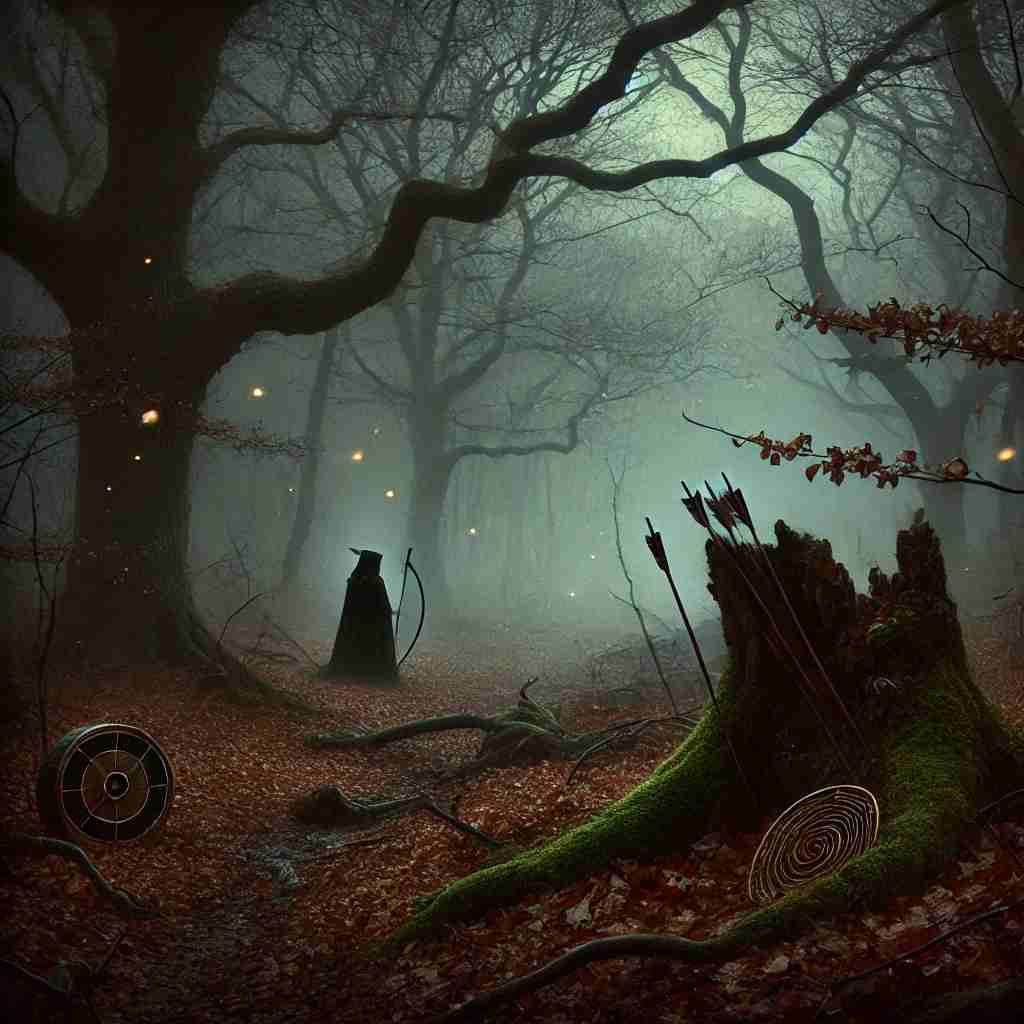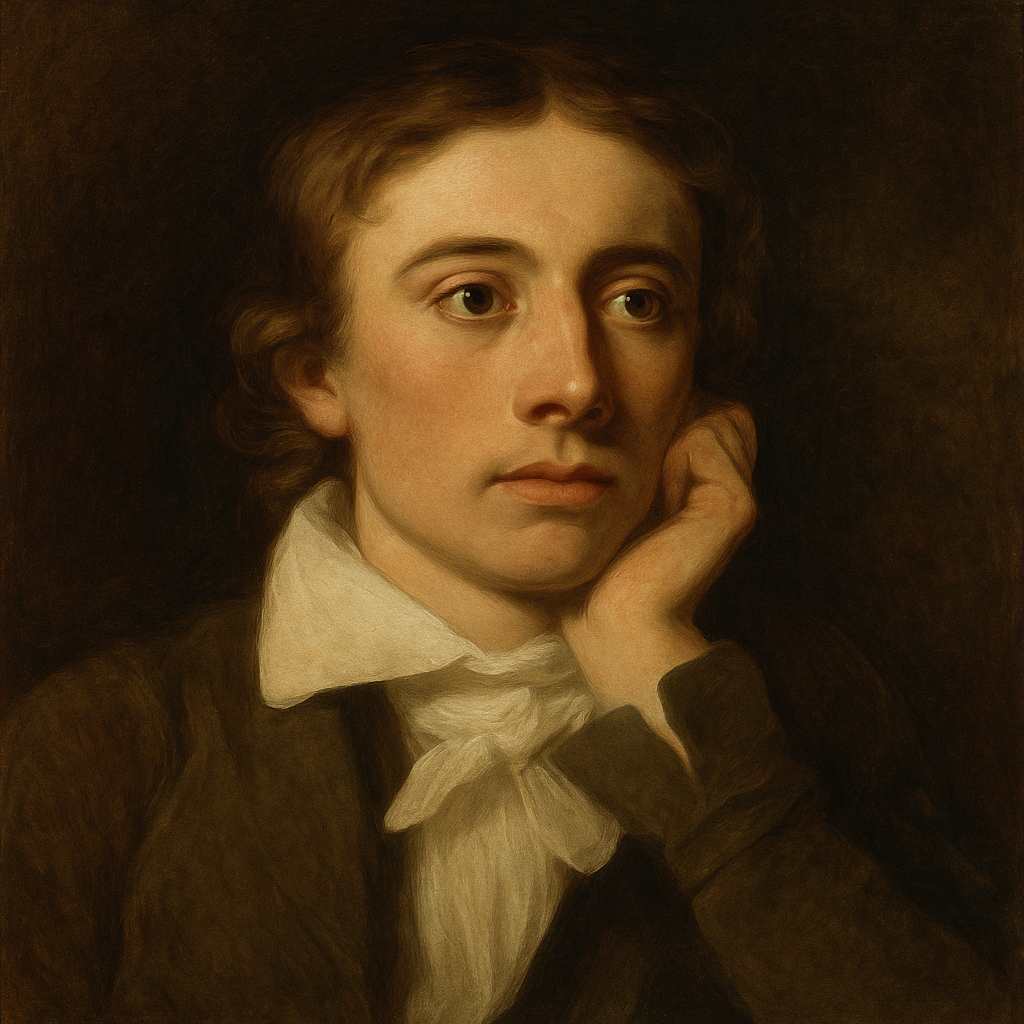Robin Hood
John Keats
1795 to 1821

No! those days are gone away,
And their hours are old and gray,
And their minutes buried all
Under the down-trodden pall
Of the leaves of many years:
Many times have winter's shears,
Frozen North, and chilling East,
Sounded tempests to the feast
Of the forest's whispering fleeces,
Since men knew nor rent nor leases.
No, the bugle sounds no more,
And the twanging bow no more;
Silent is the ivory shrill
Past the heath and up the hill;
There is no mid-forest laugh,
Where lone Echo gives the half
To some wight, amaz'd to hear
Jesting, deep in forest drear.
On the fairest time of June
You may go, with sun or moon,
Or the seven stars to light you,
Or the polar ray to right you;
But you never may behold
Little John, or Robin bold;
Never one, of all the clan,
Thrumming on an empty can
Some old hunting ditty, while
He doth his green way beguile
To fair hostess Merriment,
Down beside the pasture Trent;
For he left the merry tale
Messenger for spicy ale.
Gone, the merry morris din;
Gone, the song of Gamelyn;
Gone, the tough-belted outlaw
Idling in the "grenè shawe;"
All are gone away and past!
And if Robin should be cast
Sudden from his turfed grave,
And if Marian should have
Once again her forest days,
She would weep, and he would craze:
He would swear, for all his oaks,
Fall'n beneath the dockyard strokes,
Have rotted on the briny seas;
She would weep that her wild bees
Sang not to her—strange! that honey
Can't be got without hard money!
So it is: yet let us sing,
Honour to the old bow-string!
Honour to the bugle-horn!
Honour to the woods unshorn!
Honour to the Lincoln green!
Honour to the archer keen!
Honour to tight little John,
And the horse he rode upon!
Honour to bold Robin Hood,
Sleeping in the underwood!
Honour to maid Marian,
And to all the Sherwood-clan!
Though their days have hurried by
Let us two a burden try.
John Keats's Robin Hood
In "Robin Hood," John Keats crafts a nostalgic lament for the passing of an era, idealizing the legendary figures of Robin Hood, Little John, Maid Marian, and their Sherwood Forest. Through rhythmic language, pastoral imagery, and a wistful tone, Keats contrasts the carefree past with the encroaching demands of modernity, celebrating the values associated with these legendary outlaws even as he acknowledges their disappearance.
Stanza One: The Loss of an Era
The opening lines of the poem, "No! those days are gone away, / And their hours are old and gray," convey a deep sense of longing for a lost age. The exclamation "No!" immediately signals the poet’s regret and firm recognition that these idyllic times cannot return. Keats personifies time, describing the "hours" as "old and gray" and the "minutes buried" under the "down-trodden pall / Of the leaves of many years." This burial under fallen leaves—a natural process of decay—suggests that the memories of Robin Hood’s time have been buried under the layers of history, lost in a forest that has continued to grow and change with the seasons.
He further emphasizes this passage of time with images of the seasons and the elements: “Many times have winter's shears, / Frozen North, and chilling East.” By referencing the "shears" of winter, Keats evokes the harshness of time, cutting away at the past as nature steadily erodes memory. The "tempests to the feast / Of the forest’s whispering fleeces" presents a contrast between the destructive power of nature and the gentleness of the forest, a haven that once shielded the outlaws. The stanza closes with a line that underlines the modernizing forces that have replaced the legendary days: “Since men knew nor rent nor leases.” Here, Keats mourns the arrival of economic pressures—rents and leases—that now bind people, replacing the freedom of Robin Hood’s Sherwood Forest with the burdens of ownership and wealth.
Stanza Two: The Silence of the Forest
Keats deepens the atmosphere of loss in the second stanza, where he describes the silence that has descended over Sherwood Forest: “No, the bugle sounds no more, / And the twanging bow no more.” These sounds, so crucial to the lore of Robin Hood, are now mere echoes in the reader's imagination. Keats’ repetition of “no more” reinforces the absolute nature of this loss. The vivid onomatopoeic imagery of the “ivory shrill” and the “twanging bow” conveys a past filled with action, life, and the energy of the hunt, while the present, in contrast, is a void.
He follows this with the eerie quietude of the forest: “Silent is the ivory shrill / Past the heath and up the hill.” This depiction of silence emphasizes the shift from a dynamic, communal past to a solitary, deserted present. The poet creates a haunting image with “lone Echo,” suggesting that even the forest itself misses the sounds that once animated it, giving half-hearted responses to imagined laughter from an age long gone.
Stanza Three: Impossible Encounters
In this stanza, Keats addresses the reader directly, exploring the idea of venturing into the forest “on the fairest time of June” with celestial bodies to guide the way. Although nature is still vibrant and alive, there is an impossibility in finding Robin Hood or his merry band: “But you never may behold / Little John, or Robin bold.” The specificity of “sun or moon,” the “seven stars,” and the “polar ray” creates an image of timelessness, as though the natural world is untouched, waiting, while human history has moved on.
The stanza continues with a vision of an empty scene where, once, men would sing “some old hunting ditty,” lost in the camaraderie of the woods. The contrast between this imagined vivacity and the emptiness of the present emphasizes Keats’s lament for a time of simple joys, symbolized by “fair hostess Merriment” and “spicy ale.” These symbols of warmth and gathering are remnants of a vanished past, contrasting sharply with the increasingly transactional world, devoid of unburdened joy and spontaneity.
Stanza Four: The Harsh Reality of Change
Keats’s tone becomes mournful in this stanza as he declares, “Gone, the merry morris din; / Gone, the song of Gamelyn.” These references to English folklore—Gamelyn, a heroic outlaw akin to Robin Hood, and the “morris din” of traditional dances—intensify the sense of cultural loss. The poet laments the “tough-belted outlaw / Idling in the ‘grenè shawe,’” envisioning how Robin’s carefree existence in the green woodlands has been utterly displaced. Keats imagines Robin and Marian awakening to this changed world, with Robin “craz[ing]” and Marian weeping.
The harshness of the modern world is conveyed through Robin’s imagined reaction: “He would swear, for all his oaks, / Fall'n beneath the dockyard strokes.” Here, Keats mourns the transformation of England’s once-vast forests into resources for industrial purposes, a process that reflects the growing dominance of economic interests over natural beauty and freedom. The line “strange! that honey / Can’t be got without hard money!” captures the bitter irony of a world in which even nature’s simplest joys have become inaccessible without financial cost, a stark contrast to the free bounty that characterized Robin’s time.
Final Stanza: Honoring the Past
The poem concludes with a call to “sing” in honor of the past, celebrating the “old bow-string,” the “bugle-horn,” and the “woods unshorn.” This stanza serves as a tribute to the values that Robin Hood and his world represent: resilience, freedom, and a close relationship with nature. The repetition of “Honour” underscores the reverence that Keats feels for this mythic past. By naming specific figures—Little John, “bold Robin Hood,” Maid Marian, and the “Sherwood-clan”—Keats immortalizes their spirits, ensuring that, though their way of life may have vanished, their ideals remain worthy of respect and remembrance.
The final line, “Let us two a burden try,” may be interpreted as an invitation to the reader to join in carrying the “burden” of honoring the past. It suggests a shared responsibility to remember and celebrate the values of the old world, even in a time that may not recognize or reward them.
Conclusion
In "Robin Hood," John Keats evokes a powerful sense of nostalgia, contrasting an idealized past with a modern world marked by economic constraints and ecological destruction. Through lyrical language and vivid imagery, Keats captures the spirit of Robin Hood’s world, a realm of freedom, companionship, and nature, before it was overtaken by the forces of modernity. This poem stands as a tribute to the enduring legacy of folklore and the values that persist even as the world changes around them, urging readers to “honour” those who lived “in the grenè shawe” and the ideals of freedom, simplicity, and camaraderie they represent.
This text was generated by AI and is for reference only. Learn more
Want to join the discussion? Reopen or create a unique username to comment. No personal details required!



Comments
No comments yet. Be the first to comment!